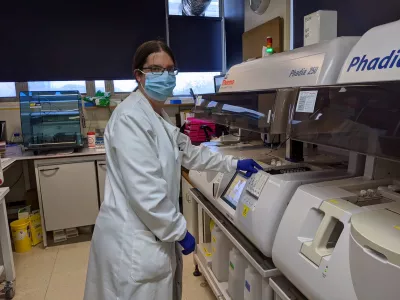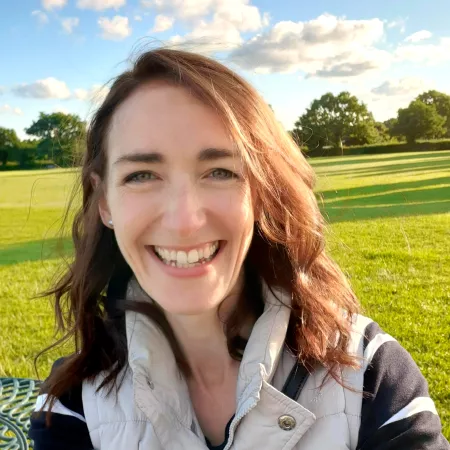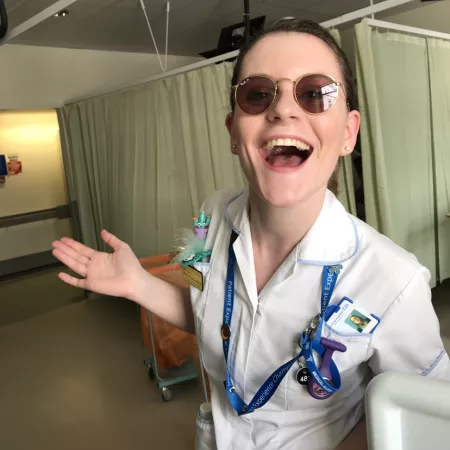
Tell us a bit about your job and your career so far?
I work as a Biomedical Scientist in an immunology lab in a large hospital. As a biomedical scientist my role is to test patient’s samples to help diagnose, treat and monitor conditions. Biomedical scientists can work in a variety of different disciplines within pathology. These include blood sciences (eg haematology, biochemistry, immunology); infection sciences (eg microbiology, virology); cell sciences (eg histology, cytology); and genetics (eg molecular pathology) to name a few.
Despite making up only 5% of the healthcare workforce, 70% of all diagnoses are attributed to the work of biomedical scientists. Biomedical scientists analyse over 150 million samples every year and everyone at some point in their life will benefit from the work that biomedical scientists do.
I started as a lab assistant and have since progressed to becoming a biomedical scientist. This was through completion of a degree in biomedical science that was accredited by the Institute of Biomedical Science and completing a competency portfolio that was needed for registration on the Health and Care Professions Council register.
What does a normal day look like for you?
A normal day for me involves testing patient’s blood (and other bodily fluids) to help diagnose and monitor conditions of the immune system. This can include testing for immune deficiencies, allergies, autoimmune conditions and blood cancers to name a few. I test samples using a mixture of analysers and manual methods. I provide and interpret test results to enable clinicians to make diagnoses and decide on treatment options for patients. I work in a multi-disciplinary team comprised of other scientists, support workers and consultants. As well as carrying out lab work I am also the Training Officer for the lab which means that I am involved in the lab based training of trainees on undergraduate and postgraduate degrees as well as providing support to colleagues undertaking NVQs in pathology and various other qualifications.
What is the best bit about your job?
The best bit about my job is knowing that I’m making a difference to patients. Particularly with autoimmune conditions it can take years for a patient to receive a definitive diagnosis. I enjoy being able to provide the vital information needed to make the diagnosis so that patients can have a clear explanation for their symptoms and start appropriate treatment. I enjoy working in a field that is constantly changing due to advances in scientific understanding and practice.
Was there anything you looked out for when searching for roles, because of your epilepsy?
The work of biomedical scientists is 24/7. When searching for positions I knew that I didn’t want to work on the shift system as disrupted sleep patterns can affect my epilepsy. As such I looked for positions that weren’t on the shift system which is how I ended up in an immunology lab as it is one of the few labs that isn’t 24/7 due to the nature of the tests we do. As I didn’t have my driving licence I also looked into how I could get to work. Fortunately most hospitals are easily accessible by public transport.
How did you find looking for a role that you wanted, that would also be right for you?
After graduating with a biomedical science degree I knew that I wanted to work in the NHS. I had very little lab experience so I initially started looking for biomedical support worker roles on the NHS website. The Institute of Biomedical Science (IBMS) website had a lot of good advice about starting a career in a laboratory and after a lot of persevering (and various other admin based jobs) I was finally successful.
Were there any considerations you made, or your employer made, regarding your epilepsy?
When I first started my employer had to complete a risk assessment to ensure that the lab was a safe working environment for me. There are some activities that I sometimes cannot complete due to side effects of my anti-epileptic medication and my colleagues have been great at making adjustments for me when this happens.
What have you told your colleagues about your epilepsy? What were their questions?
My colleagues are aware that I have epilepsy. When I started I spoke to the first aider to describe what a normal seizure looks like for me. Due to the nature of the work that I do I wanted to make sure that they knew what to look out for and how they can keep me safe. Ironically I am now one of the first aiders for the lab which has been beneficial for newer members of staff joining the department who also have epilepsy.
Generally when my colleagues find out that I have epilepsy they mainly want to know what they should do if I have a seizure. Working in a hospital has distinct advantages in that there are medics around to help if my colleagues aren’t sure of what to do which is reassuring to them and to me.
What advice would you give to a young person with epilepsy who is beginning their journey into employment?
Don’t let epilepsy restrict your ambitions. Employers have a legal obligation to make reasonable adjustments to a workplace to support you. I’ve found that it’s best to be upfront about it as that way it's not a big surprise if you have a seizure. It also gives you freedom to choose how to tell colleagues about what to look out for and what you would like them to do if you have a seizure.
Have you ever had a seizure at work, and if so what was that experience like?
Whilst working as a trainee in the lab I had numerous complex partial seizures during work. My colleagues were great and looked after me until I had recovered. Because they knew about my epilepsy they didn’t make a big scene and were able to help me in the ways that I’d asked them to help me.
Since working as a qualified biomedical scientist I have had several instances of having had a seizure during my sleep. My colleagues have been really understanding when I have phoned in about me taking time off work to recover from these and have always encouraged me to take as long as I need.




